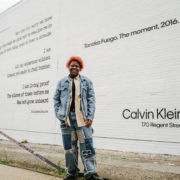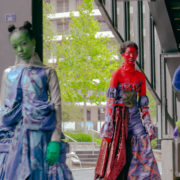Grabbing mics and sharing spotlights: The recent twist in the life of a music producer

Words by: Margaret “Meg” Sagoe
Gone are the days when music producers were seen as studio rats, hunched over their equipment in a dingy studio, now they hold the limelight as much as artists.
Moving as ‘silent shadows’ in the music space, it was really easy to forget or simply not recall who the producer was on a hit song. Bar a few exceptions, the majority of people failed to recognise what a producer really did, and no one seemed to care. Their value was barely appreciated and for years producers in African music have had to put up with not being accorded the recognition they deserved or sometimes, the monetary remuneration they deserved.
Like most marginalised groups, music producers have slowly recognized the need to speak up for themselves but in different ways. They have definitely become more visible, having active social media profiles and doing a great job at putting a face to their famed tagline on beats. Some choose to remain in the shadows but more and more are putting themselves out and for some, this includes putting out their own music. This trend may not be new to most record producers in the western music scene but in Africa, it has been a slow adoption process.
Prominent names like Juls, one of the pioneers of Afrobeats in the diaspora, GuiltyBeatz, and more are orchestrating the best voices for their productions, fulfilling the full definition of being a producer. Juls for instance has been able to get the likes of Santi, Kojo Funds, Wande Coal, King Promise and more on his productions, releasing singles as well as albums without singing a word on the track, save for his tagline.
If there’s anything at all that this alternative direction is doing, it is definitely getting music listeners the chance to get familiar with a producer’s unique style. On projects like these, the producers get to be in the front seat, dictating what should be done and getting exactly what they want out of artists. Releasing their own singles or projects additionally offers them the chance to show off and basically do whatever they want, including experiment, on a record.
Take Guilty Beatz’ smooth 6 track EP, Different and the viral hit song, “Akwaaba” featuring Pappy Kojo, Patapaa and Mr Eazi for instance. The record producer played around with SA (South African) House and Afrobeats with a sprinkle of Dancehall, very different from his usual Afrobeats and Afropop sounds.
For some other producers, moving into the spotlight meant getting their vocals on to their own records. Moor Sound, a young Ghanaian producer who released his debut album, Summertime Sound introduced himself as an artist on the track “Machine”. For him, at the time he was recording, it was just about convenience. The country was on lockdown due to the pandemic and he was stuck in the studio, making beats. Thinking about the process it’d take to get the artist he wants to get in vocals on time or come record in his studio, he got in the booth and laid down his own verse. Other Ghanaian producers like Yung D3mz, Uche B and Boye The Genius released a collaborative EP last year, Girls Like You , a 5 track EP with vocals and production completely by them.
Others, in making their debut as artists, have decided to separate the producer from the artist and perform under an entirely different name. An example would be Ghana’s former La Meme Gang member, Nxwrth who now doubles as an artist under the name “Froyε“ (translated as ‘the sauce’). Froyε’s debut was on the hot new drill song, “Kazan” by Kwaku BS which was also produced by Nxwrth.
What led to this wave of record producers standing up and making themselves visible? Maybe they realized it was time to get acknowledged more for the fact that they form a substantial part of the music-making process. They literally develop the base of a song and often then contribute to the song-making process further, during sessions with artists, to mould tracks to completion. There is still also the very prevalent issue of music producers not being paid enough for their work. This is even the case after a song becomes a viral hit. Most producers may have taken steps to make sure they split revenue made from streams and more, but some conclude that there isn’t enough money in music production alone.
So what better way is there to attempt to survive than putting out your own music which will guarantee making appearances and playing at shows, which is the biggest way of making money in music, especially in Africa.




![ZINO VINCI’S ‘FILTHY & DISGUSTING’EP BRINGS YOU TO THE CORE OF THE ARTIST [@ZinoVinci]](https://guap.co/wp-content/uploads/2023/10/Zino-4.jpg)




